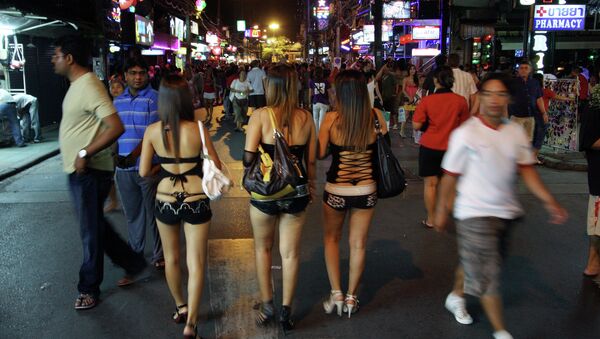A lockdown to curb the spread of the sweeping infectious disease COVID-19 has forced quite a few, including sex workers who previously worked in bars, massage parlours, and other venues, onto the streets.
There, those who cannot afford self-isolation at home, are increasingly searching for clients, outside the curfew hours that took effect Friday from 10 p.m. to 4 a.m.
"I'm afraid of the virus but I need to find customers so I can pay for my room and food", Pim, a 32-year-old transgender sex worker, told AFP.
She is now in an area of Bangkok where neon-lit bars and brothels have at some point gone dark, with sex workers having to face a dilemma - either to self-isolate or take risks and continue hunting for customers on the city’s main tourist drags. For Pim the choice was predetermined: she has not had a customer for 10 days while her bills continue to stack up.
Her friend Alice, another transgender sex worker, has also been forced to move from a go-go bar, from where dancers occasionally go home with customers, onto the largely empty streets.
"I used to make decent money sometimes $300-600 a week", Alice recalls, going on to lament the ubiquitous shutdown:
"But when businesses shut down my income stopped too. We are doing this because we're poor. If we can't pay our hotel they will kick us out", she says stressing that they are more afraid of having nothing to eat than the virus.
The government says it is ready to enforce a 24-hour curfew if necessary to control a virus that has infected more than 2,000 people and killed 20, according to official figures. The authorities have promised to assist those who had to ditch their jobs during a sweeping crisis, but concerns are mounting that a Thai government emergency scheme to give 5,000 baht ($150) to millions of newly jobless over the next three months will exclude sex workers because they cannot prove formal employment. The sex industry in Thailand is illegal but commonly accepted.
The Empower Foundation, an advocacy group for the kingdom's sex workers, argued in an open letter to the government that women suffer the most under these circumstances, as many are mothers and their families’ bread winners.
Outlining the workers’ woes, the group called on the authorities to "find a way to provide assistance to all workers who have lost their earnings".
The sex industry, like the whole of the service sector, has naturally been hit by the epidemic across the board, with sex workers increasingly turning to webcam performances and provision of phone sex services amid governments' and WHO recommendations to avoid physical contact and stick to enforced hygiene measures.

